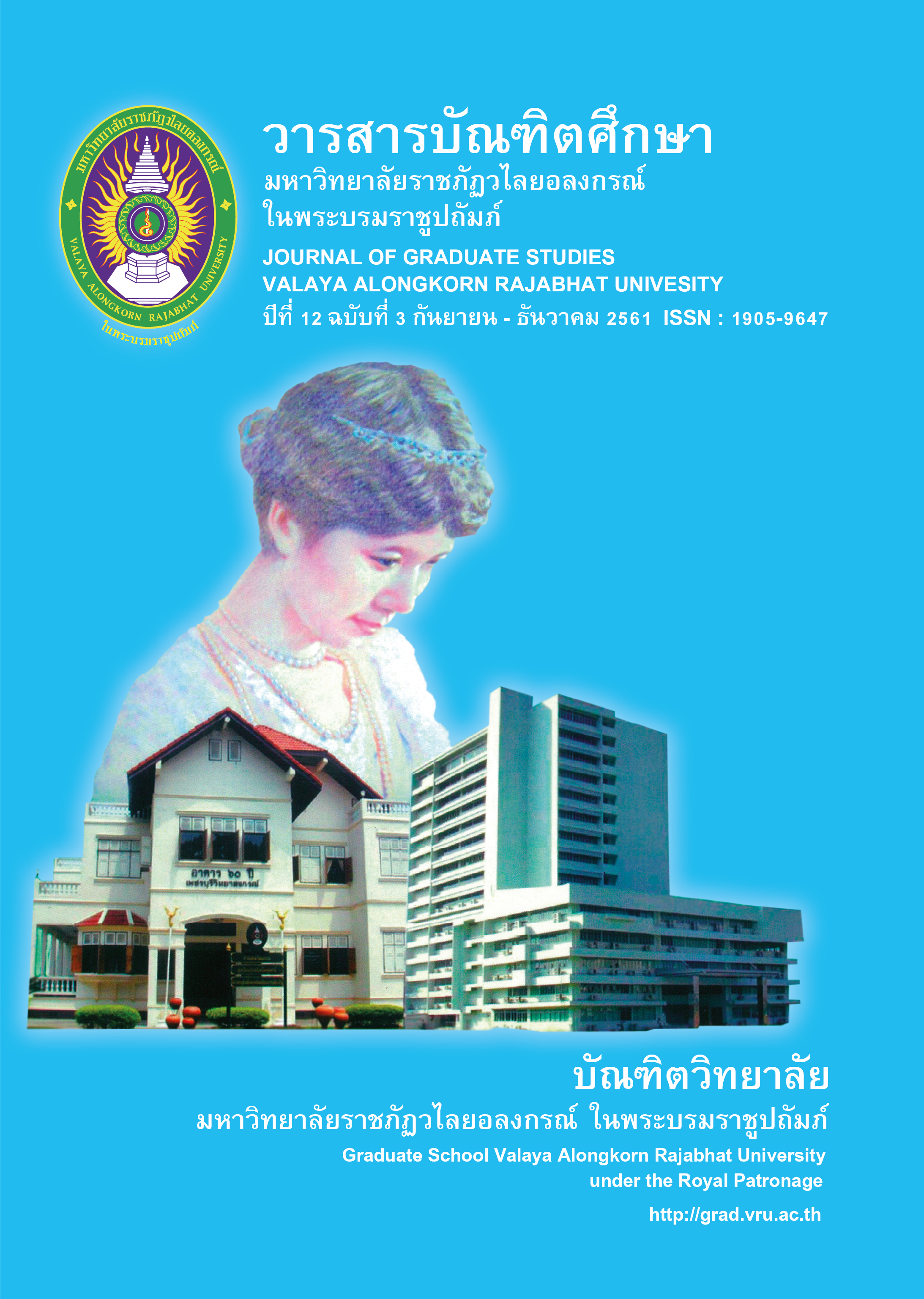THE DEVELOPMENT OF INSTRUCTIONAL MODEL BASED ON AUTHENTIC EXPERIENCES TO ENHANCE SELF-DIRECTED LEARNING CHARACTERISTICS OF LOWER SECONDARY STUDENTS การพัฒนารูปแบบการเรียนการสอนแบบเน้นประสบการณ์ตามสภาพจริง เพื่อส่งเสริมคุณลักษณะการเรียนด้วยการนำตนเอง ของนักเรียนชั้นมัธยมศึกษาตอนต้น
Main Article Content
Abstract
The objectives of this research were 1) to develop an instructional model using authentic experiential learning to enhance self-directed learning characteristics of lower secondary students, and 2) to evaluate the effectiveness of the instructional model using authentic experiential learning to enhance self-directed learning characteristics of lower secondary students. The research was conducted into 4 stages including: 1) the study of relevant theories, concepts and related documents, 2) the development of an instructional model using authentic experiential learning to enhance self-directed learning characteristics, 3) the experiment of the development instructional model, and 4) the evaluation of the effectiveness of the instructional model. Samples in stage 3 were two class of students using cluster random sampling from ninth grade secondary students at Satri Watrakhang School affiliated with the Secondary Educational Service Area Office 1 who enrolled in the Buddhism course in the second semester of the academic year 2017. Samples were randomly assign into the experimental group consisted of 49 students learned through the activities based on the developed model while the controlled group consisted of 50 students learned through traditional learning activities. Research instruments included the lesson plans, the achievement test, the evaluation form of the self-directed learning characteristics, and the student satisfaction questionnaire. Data were analyzed by mean, standard deviation, and t-test.
The findings were as follows:
- The developed instructional model consists of 4 components: 1) principles, 2) objectives, 3) stages of instructional procedures including learning required experience, reviewing and reflecting, creating the main concepts, and authentic applying, and 4) assessment and evaluation.
- The effectiveness of the developed instructional model revealed that: 1) the learning achievement in posttest of the experimental group were significantly higher than the posttest average scores of the control group at the .05 level, 2) the learning achievement in posttest of the experiment group were significantly higher than the at the 0.05 level, 3) the self-directed learning characteristics in terms of discipline, responsibility, and confidence were at a high level, 4) the students’ satisfaction towards the developed instructional model was at a high level in the aspects of learning environment, learning activities, and expected benefits.
Article Details
บทความทุกเรื่องได้รับการตรวจความถูกต้องทางวิชาการโดยผู้ทรงคุณวุฒิ ทรรศนะและข้อคิดเห็นในบทความวารสารบัณฑิตศึกษา มหาวิทยาลัยราชภัฏวไลยอลงกรณ์ ในพระบรมราชูปถัมภ์ มิใช่เป็นทรรศนะและความคิดของผู้จัดทำจึงมิใช่ความรับผิดชอบของบัณฑิตวิทยาลัย มหาวิทยาลัยราชภัฏวไลยอลงกรณ์ ในพระบรมราชูปถัมภ์ กองบรรณาธิการไม่สงวนสิทธิ์การคัดลอก แต่ให้อ้างอิงแหล่งที่มา
References
เกษม วัฒนชัย. (2545.) การปฏิรูปการศึกษาไทย. กรุงเทพฯ : สำนักงานคณะกรรมการการศึกษาขั้นพื้นฐาน.
เขมณัฎฐ์ มิ่งศิริธรรม. (2552). การพัฒนารูปแบบการเรียนบนเว็บเชิงบูรณาการระหว่างการเรียนแบบร่วมมือกับการเรียนร่วมกันเพื่อส่งเสริมการเรียนด้วยการนำตนเองของนักศึกษาระดับปริญญาบัณฑิตคณะศึกษาศาสตร์. วิทยานิพนธ์ปริญญาดุษฎีบัณฑิต. กรุงเทพฯ: จุฬาลงกรณ์มหาวิทยาลัย.
จุฬารัตน์ เพชรวิเศษ. (2554). การพัฒนาโปรแกรมการศึกษานอกระบบโรงเรียนตามแนวคิดการเรียนรู้โดยใช้ปัญหาเป็นหลักการเรียนรู้ด้วยการนำตนเองเพื่อพัฒนาสมรรถนะความรอบรู้แห่งตนสำหรับพยาบาลหัวหน้าหอผู้ป่วย. วิทยานิพนธ์ปริญญาดุษฎีบัณฑิต. กรุงเทพฯ: จุฬาลงกรณ์มหาวิทยาลัย.
ทิศนา แขมมณี. (2557). ศาสตร์การสอน : องค์ความรู้เพื่อการจัดกระบวนการเรียนรู้ที่มีประสิทธิภาพ. พิมพ์ครั้งที่ 18. กรุงเทพฯ: จุฬาลงกรณ์มหาวิทยาลัย.
นัดดา อังสุโวทัย. (2550). การพัฒนารูปแบบการเรียนการสอนวิชาเคมีที่เน้นกระบวนการเรียนรู้แบบนำตนเองของนักศึกษาระดับปริญญาตรี. ปริญญาณิพนธ์ กศ.ด. วิทยาศาสตรศึกษา. กรุงเทพฯ: มหาวิทยาลัยศรีนครินทรวิโรฒ.
นิตยา สำเร็จผล. (2547). การพัฒนาตัวบ่งชี้การเรียนรู้ตลอดชีวิต. ปริญญานิพนธ์ กศ.ด. การวิจัยและพัฒนาหลักสูตร. กรุงเทพฯ: บัณฑิตวิทยาลัย มหาวิทยาลัยศรีนครินทรวิโรฒ.
ประเวศ วะสี. (ม.ป.ป.). สู่สังคมแห่งการเรียนรู้ ปฏิรูปทางปัญญา พาชาติออกจากวิกฤต. กรุงเทพฯ: มาตาการพิมพ์.
พรรณี ลีกิจวัฒนะ. (2550). วิธีการวิจัยทางการศึกษา. พิมพ์ครั้งที่ 2. กรุงเทพฯ: คณะครุศาสตร์อุตสาหกรรม สถาบันเทคโนโลยีพระจอมเกล้าเจ้าคุณทหารลาดกระบัง.
ไพฑูรย์ สินลารัตน์ และคณะ. (2550). โครงการวิจัยบูรณาการ การเปลี่ยนผ่านการศึกษาเข้าสู่ยุคเศรษฐกิจฐานความรู้. ม.ป.ท.
วิชัย วงษ์ใหญ่. (2542). กระบวนทัศน์ใหม่: การจัดการศึกษาเพื่อพัฒนาศักยภาพของบุคคล. (พิมพ์ครั้งที่ 5). กรุงเทพฯ: เอส พี พริ้นติ้ง.
วิลาสินี พลอยเลื่อมแสง. (2554). การพัฒนารูปแบบการเรียนการสอนแบบเน้นกระบวนการและผลงานร่วมกับการเรียนรู้ด้วยการนำตัวเองเพื่อเสริมสร้างความสามารถในการเขียนภาษาอังกฤษเชิงธุรกิจของนักศึกษาปริญญาตรี. วิทยานิพนธ์ปริญญาดุษฎีบัณฑิต.กรุงเทพฯ: จุฬาลงกรณ์มหาวิทยาลัย.
Conner, M. L. (1997). Learning from Experience. (n.p.): Ageless Learner.
Guglielmino, L. M. (1997). Development of the self – directed learning readinessscale.
Evans, N. (1994). Experiential Learning for All. New York: Cassel.
Jaques, D. (1993). Designing and Evaluation Courses. New South Wales: Educational Methods Unit. Oxford Brooke University
Joyce, B. and Weil, M. (1996). Model of Teaching. Toronto: Allyn & Baoon.
Kolb, D. A. (1984). Experiential Learning: Experience as the source of learning and development. Englewood Cliffs: Prentice-Hall.
Newman, F. (1993). Traditional Crafts and Educational Leadership Tips. 50 (7), 8-12

